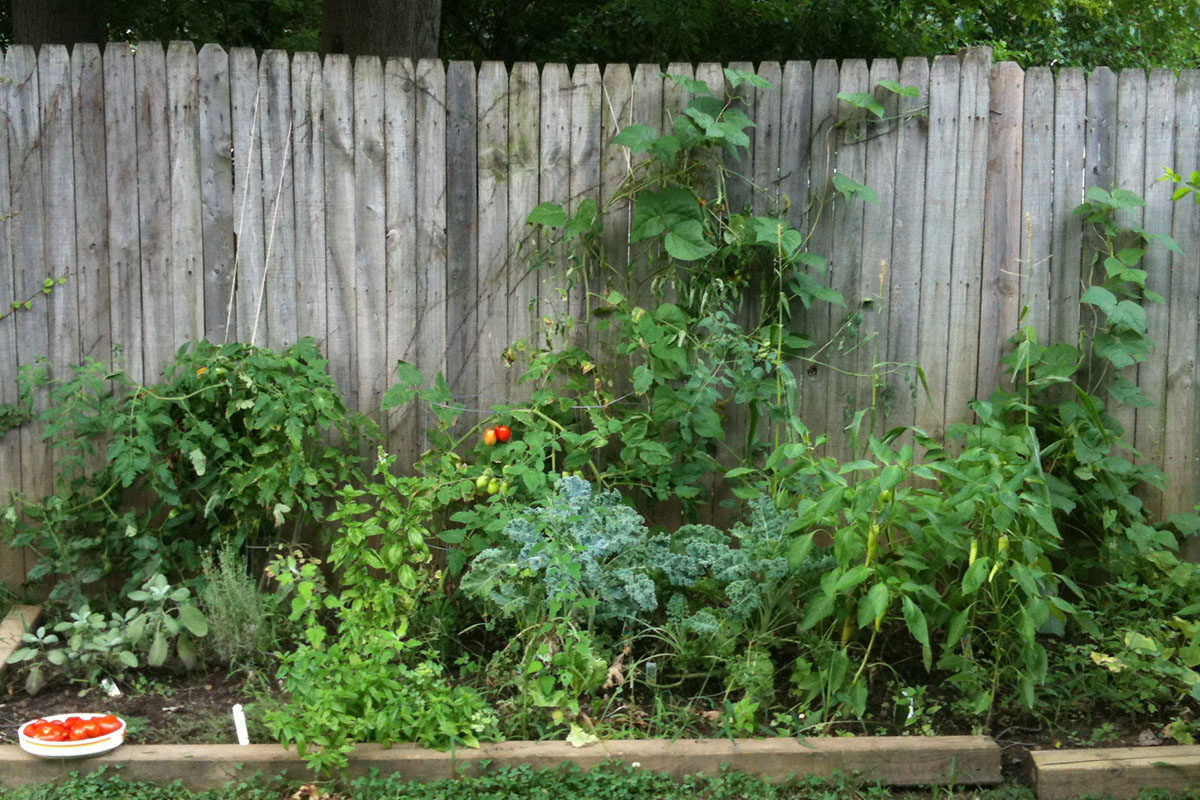
Limited yard space can be a good thing for begining gardeners. It is better to start small, says Dr.Lucy Bradley, since you'll be more likely to manage the garden (rather than becoming overwhelmed). (Josephine McRobbie)
Dr. Lucy Bradley is an urban horticulture professor and extension specialist at North Carolina State University. Producer Josephine McRobbie called Dr. Bradley to get some tips for novice gardeners who are interested in growing their own food while under Shelter in Place orders.
As an extension specialist, Dr. Bradley fields questions from budding gardeners around the state. She’s seen an increase in inquiries in recent weeks. She thinks that beyond the practicalities, home gardening can help to manage anxieties in a difficult time. “It's a whole different feeling and space to be in, when you know you have the skill and the resources to take care of yourself in some ways,” she says. And her own backyard of fruit trees and veggie beds is serving her and others well. “It’s great right now because we have plenty to share, which is a wonderful feeling when things seem scarce.”
Dr. Bradley says that choosing a sunny spot, that’s gently sloped or flat, with the best soil available around your house, will lead to the best garden. Accessibility is also important. She plants herbs and greens along the walkway into her house, so she can weed and pick plants on her way in and out of the house. Small spaces can actually be a positive. “It's a whole lot better, I think, to have a well managed 4 foot squared area, than to have a 10 by 10 foot square area that you can't keep up with, and the weeds are out competing with your vegetables, and it's demoralizing every time you go out,” she laughs. “It's hard to have it be a joyful thing when it's such a heavy load. So start small, you can expand over time as you improve the soil, and you manage the weeds, and you get into the rhythm of the garden.” She says that large containers on apartment balconies can grow most herbs and veggies, and that in apartments with limited outdoor or sunlit space, leafy greens and herbs have the best chance of thriving.
Long-forgotten seed packs can still germinate. “Many seeds stay viable for years after their expiration date,” Dr. Bradley says. “If you have kept them in the dark, if you kept them dry, if you kept them from being in extreme temperature, they may well still be viable. Put a wet piece of paper towel into a Ziploc bag and put, three to five seeds in that bag, and see if they germinate or not. That's a great way to test what you've got, to decide whether it is be worth your time to go ahead and try and plant them out.”
As director of NC State’s Urban Horticulture program, Dr. Bradley helps to support community gardening, school gardens, and even therapeutic gardening programs. “Gardening is therapeutic in so many ways,” she says. It's good physically that you're out there in the sunshine, lifting and stretching and carrying. It's great emotionally, just being able to play and be creative in your own way. And having space to just relax, and enjoy the peace of nature is really important.”
Dr. Bradley recommends asking for help or reading a little before you begin planting, noting that county extension offices, blogs, books, videos, and friends and family are all great sources of information. “It's totally doable (and) it's easier every year,” she says. “The first year is the hardest year, for sure, so don't despair. If you're trying to do it right now, in less than optimal circumstances, just starting is great because you everybody every time you work with the soil, you're improving it. You're adding compost when you can, you're putting mulch on top to suppress the weeds, and that'll break down and improve the soil. Every year it gets better and easier. So this is a good time to start.”
Hear the story on this episode of Earth Eats.












